

Facebook. Twitter. Social Media in UWS. Using Social Media to Break Down Silos and Connect. Why Do We Connect: The Power of Online PD. Flipped Classroom: The Full Picture for Higher Education. The Flipped Classroom, as most know, has become quite the buzz in education.
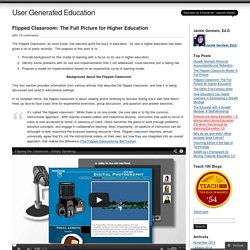
Its use in higher education has been given a lot of press recently. The purpose of this post is to: Provide background for this model of learning with a focus on its use in higher education.Identify some problems with its use and implementation that if not addressed, could become just a fading fad.Propose a model for implementation based on an experiential cycle of learning model. Background About the Flipped Classroom This first section provides information from various articles that describe the flipped classroom, and how it is being discussed and used in educational settings. In its simplest terms, the flipped classroom is about viewing and/or listening to lectures during one’s own time which frees up face-to-face class time for experiential exercises, group discussion, and question and answer sessions.
It’s called “the flipped classroom.” Hybridity, pt. 3: What Does Hybrid Pedagogy Do? This is the third in a series of articles that investigates hybridity as it relates to our positions as teachers and scholars, but also as learners, composers, and community members.
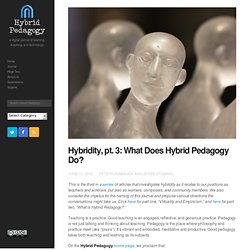
We also consider the impetus for the naming of this journal and propose various directions the conversations might take us. Click here for part one, “Virtuality and Empiricism,” and here for part two, “What is Hybrid Pedagogy?” Teaching is a practice. Making social media work professionally. PC Hanif Sanghar was so pleased to have been involved in an operation to catch two vicious attackers that he tweeted he had "arrested the offenders", even though the suspects had yet to stand trial.
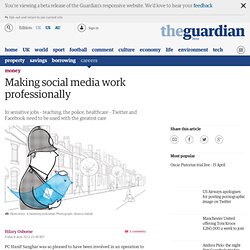
The tweet was deleted and he was reprimanded. Doctors and nurses at a hospital in Swindon were suspended after posting pictures of themselves lying face down on resuscitation trolleys, ward floors and on the Wiltshire air ambulance helipad on Facebook as part of an internet craze called "the lying down game". And in America teacher Ashley Payne lost her job after a parent spotted a Facebook picture of her with a glass of wine in one hand and a beer in the other. Reading these stories could give you the impression that there are certain careers where using social media is a recipe for disaster. But while much has been made of the benefits of tools such as Twitter and Facebook to the corporate world, there are advantages to using them in other more sensitive jobs.
The tweeting teacher. Why social networkers are more likely to get ahead at work. A recent Google project on how social tools are used in business showed how those embracing them at work are more likely to get promoted than those who don't.
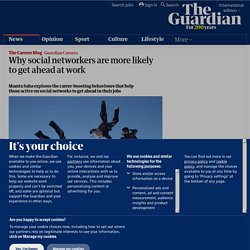
The research found 86% of frequent users said they have recently been promoted and 72% said they are likely to be promoted, compared to 61% and 39% of non-users. The report - How social technologies drive business success - hails these workers as 'the new social climbers', because they know how to embrace the tools in the right way to get ahead. In reality, there are a number of reasons why social networkers are more likely to progress in their career and it appears that the most successful, visionary companies are already acknowledging the benefits of these tools to make it easy to connect and work together online.
According to the Google research, high growth companies are most likely to use social tools. Social Media in Higher Education. Preventing social media fatigue: live chat. How Higher Education Uses Social Media [INFOGRAPHIC] Schools are on a short list of organizations that have been notoriously slow to adopt emerging tech.
![How Higher Education Uses Social Media [INFOGRAPHIC]](http://cdn.pearltrees.com/s/pic/th/higher-education-infographic-132292462)
But within the last few years, as social media becomes more integral to students' lives, educational institutions are finally catching on, and catching up. When it comes to higher ed, there are not only opportunities for digital learning, but digital marketing too. Some schools have taken the reigns on both sides, with mixed results. SEE ALSO: 5 Free Homework Management Tools for the Digital Student The infographic below takes a look at how schools have fared with social media over the last few years — what platforms are best, where they've succeeded, and the challenges that lay ahead. SocialEdCon: What the Heck Do We Do with Social Media? Greetings from sunny San Diego.
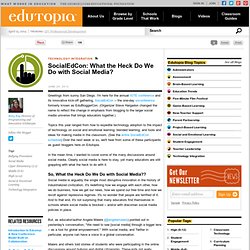
I'm here for the annual ISTE conference and its innovative kick-off gathering, SocialEdCon -- the one-day unconference formerly known as EduBloggerCon. (Organizer Steve Hargadon changed the name to reflect the change in emphasis from blogging to the larger social media universe that brings educators together.) Is Our Higher Education System Fit for Purpose?
As regular readers of the Energise 2-0 blog will know, we have a particular interest in the impact of social media on Higher Education.
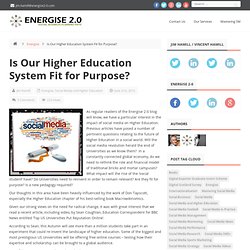
Previous articles have posed a number of pertinent questions relating to the future of Higher Education in a social world. Will the social media revolution herald the end of Universities as we know them? In a constantly connected global economy, do we need to rethink the role and financial model of traditional bricks and mortar campuses? What impact will the rise of the ‘social student’ have? Do Universities need to reinvent in order to remain relevant? Our thoughts in this area have been heavily influenced by the work of Don Tapscott, especially the Higher Education chapter of his best-selling book Macrowikinomics. Given our strong views on the need for radical change, it was with great interest that we read a recent article, including video, by Sean Coughlan, Education Correspondent for BBC News entitled ‘Top US Universities Put Reputation Online’.
Social Media in Higher Education [Case Study @CarlowU] Posted by Guest on June 14, 2012 · 3 Comments Social media use in higher education fascinates us.
![Social Media in Higher Education [Case Study @CarlowU]](http://cdn.pearltrees.com/s/pic/th/education-integrated-marketing-82246715)
So we talked our friend @JennyMacBeth, the comms project manager at Carlow University, into sharing this case study so that you can see what’s worked, what hasn’t and maybe get some food for thought that will help with your own social media efforts. To our way of thinking and pretty much across the board, the things that Jenny has shared in this case study are applicable whether you’re using social media in the higher education space—or anywhere. The Back Story – More About Carlow University Carlow University is a comprehensive Catholic masters university that prepares students for leadership and compassionate service in professional and personal life.
Social Media in Higher Education - Barriers & Digital Literacy. Useful Social Media Resources for Higher Education Professionals. Digital literacy can boost employability and improve student experience. The nature of knowledge is changing and, in this digital age, our definition of basic literacy urgently needs expanding.
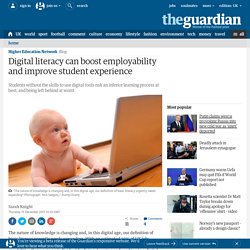
With an estimated 90% of UK jobs requiring some level of IT competency, the notion of digital literacy – those capabilities that equip an individual for living, learning and working in a digital society – is one that needs to be taken seriously by colleges and universities. We live in an online world with the digital divide closing up both through government initiatives (Martha Lane Fox, the government's digital champion, recently took up the challenge of getting 10 million people in the UK online, saying that otherwise "they will be even more isolated and disadvantaged as government and industry expand ever faster into digital-only services") and technological advances – more than half the UK population now own a smartphone with internet capability.
But it's not just about employability – increasingly digital literacy is vital for learning itself. Why Teachers Need Social Media Training, Not Just Rules. 6.2.12 | Under a new set of social media guidelines (pdf) issued by the New York City Department of Education, teachers are required to obtain a supervisor’s approval before creating a “professional social media presence,” which is broadly defined as “any form of online publication or presence that allows interactive communication, including, but not limited to, social networks, blogs, internet websites, internet forums, and wikis.”
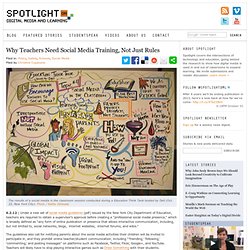
The guidelines also call for notifying parents about the social media activities their children will be invited to participate in, and they prohibit online teacher/student communication, including “‘friending,’ ‘following,’ ‘commenting,’ and posting messages” on platforms such as Facebook, Twitter, Flickr, Google+, and YouTube. Teachers will likely have to stop playing interactive games such as Draw Something with their students. “[Conversations] occur at church, in neighborhoods, scouting groups, volunteers,” he said. “Other offline places. Available now: a guide to using Twitter in university research, teaching, and impact activities.
Teachers' Comprehensive Guide to The Use of Social Networking in Education.